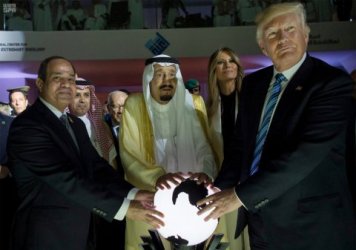US Secretary of State Rex Tillerson said on June 14 that Washington is going to support “elements” that would ensure a “peaceful transition” in the Islamic Republic.
“Our policy towards Iran is to push back on this hegemony, contain their ability obviously to develop nuclear weapons, and to work towards support of those elements inside of Iran that would lead to a peaceful transition of that government. Those elements are there, certainly as we know,' Tillerson said.
Moreover, the Senate on June 15 voted 98-2 for new sanctions on Iran, though yet to be ratified by the Congress and President Donald Trump to take effect the new sanctions need to be endorsed.
The US Secretary of State, on the same day, published documents pertaining to the relations between Tehran and Washington in 1950s and the US intervention in the August 19, 1953 Iranian coup d'état, engineered to overthrow the democratically elected Prime Minister Mohammad Mosaddeq in favor of strengthening the monarchical rule of the Shah regime.
Now the million-dollar-question is, what is behind the recent Washington approach towards the Islamic Republic and the concurrence of such provocative moves, and that why the US remains to be so outspoken in calling for a so-called “peaceful transition” in the Islamic Republic, stirring up public opinion in the country, while Iranians voted overwhelmingly to elect a moderate President in the landmark May 19 Iran elections.
Apart from the US longstanding, deep hostility towards Iran, something that makes inevitable assuming such approaches by the White House towards the Islamic Republic, a more appropriate answer to the above question should be sought in what happened during the recent trip by US President Donald Trump to the region and his visit to Saudi Arabia and Israel, two enemies of the Islamic Republic.
In fact, one can guess that imposition of new sanctions on Iran is mainly the result of a scenario constructed by the two regional enemies of Iran, namely, Saudi Arabia and the Zionist regime that remain courting the “headmaster” to put pressure on Iran and weaken their regional rival.
Undoubtedly, that is not the whole story and Riyadh and Tel Aviv have gone even further to ask the conservative US Administration to put an end to the nuclear deal between Tehran and Major world powers, known as the Joint Comprehensive Plan of Action.
Led by Saudi Arabia, the Arab countries in the Persian Gulf as well as the Zionist regime were the main two parties in the region disturbed by the landmark nuclear deal and described it as a danger! both for themselves and the region.
So, it is not going to be surprising if they offer Washington an array of concessions in return for Trump’s effort to live up to his campaign promise and tear up the JCPOA.
But, under pressure from Riyadh and Tel Aviv, Trump has attempted in various occasions to stop the implementation of the international deal even calling for the JCPOA to be reviewed again by Europe, something the EU has repeatedly rejected.
On the other hand, Iran has steadfastly remained to be committed to the nuclear deal, denying the US the chance to criticize the Islamic Republic for its failure to appropriately implement the deal and fulfill commitments.
Now, frustrated by all efforts, to “forge an anti-Iran consensus”, the US Administration has adopted a unilateral policy of “threats and sanctions” to “provoke outrage” in the Islamic Republic.
Based on such policy, they are embarking on a series of consecutive provocative and hostile actions against Iran, trying to force the country to retaliate and act in a way to satisfy the public opinion and domestic opponents of the nuclear deal and, in this way, distance itself from its international commitments. And it is at this stage of the game, if materialized, that the US would have the wherewithal it needs to portray Iran as a threat, and prepare the way for a global consensus against the Islamic Republic and put the nation under increasing pressures.
Under such circumstances, only through solidarity and consensus among all the political forces in Iran, withdrawing unnecessary pressures from the government and employing all the legal and diplomatic tools, the country can avoid from entering the new game by the United States.
Written by: Mohammad Mehdi Mazaheri, university lecturer and Middle East expert
Translated by: Reza Bahar
Edited by: Hamid Shamlou
2044**2050
Publish Date: 21 June 2017 - 18:11

Tehran, June 21, IRNA – The Islamic Republic of Iran in recent weeks has again been in the spotlight in the United States, as decision-makers in Washington are mulling over putting together an ambiguous scheme to deal with Iran.